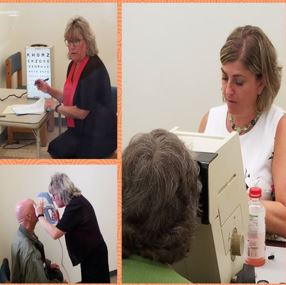Schedule Free eye screening for your community by contacting The Commission for the Blind and Visually Impaired (CBVI)
Call: (973) 648-7400 / Toll Free (877) 685-8878
Free Eye Screening Locations/Schedule

National Researchers say: “50% of all cases of blindness or severe vision loss could have been prevented by early detection of disorders and the appropriate follow-up care.”
The NJ Department of Human Services, Commission for the Blind and Visually Impaired believes that every resident of NJ has the right of access to services that will prevent or limit the impact of vision loss. We are very proud that, for over 35 years, CBVI has provided services in the areas of eye health and eye safety by offering free vision screenings for adults and children with a concerted effort to provide these services to historically underserved sectors of the population (low income, elderly, minorities, people with Diabetes and individuals with special needs).
CBVI’s Project BEST program works to save sight and restore vision whenever it is medically possible. Services include: mobile eye examination unit; vision screening for preschool and school-age children; monthly or semi-monthly eye screenings at more than 28 fixed sites all over the state; on-site screening at institutions and in communities; special diabetic detection and awareness programs; and other specialized eye screening programs which target historically underserved populations (i.e. minorities, the elderly, migrant farm workers, etc.)
Project BEST Services:
- Preschool Screening
- Adult Vision Screening
- Mobile Unit Screening
- Diabetic Eye Screening

- Migrant Worker Screening
Studies show that 50 percent of all blindness and vision loss could have been prevented with proper eye care. The Commission for the Blind and Visually Impaired (CBVI) provides a wide range of services intended to save sight and restore vision whenever it is medically possible. These include vision screenings at schools and other institutions, a diabetic outreach program, eye-health nursing services and use of a mobile eye examination unit to help reach under-served groups such as special needs children and adults, migrant farm workers and the elderly.
In 2012, CBVI provided free eye health services to more than 40,000 individuals. Approximately ten percent of the people screened had an undetected eye condition and were referred for follow-up care. Many of these individuals were also found to be eligible for other CBVI services.
Other CBVI Services include:
- Vocational Rehabilitation Services for individuals to become employable and obtain employment;
- Education Services for students to help them succeed in their local public school program;
- Rehabilitation Teaching for individuals to manage their household and perform task of daily living with impaired vision;
- Orientation and Mobility Instruction to assist individuals in traveling independently;
- Referral to community resources for housing, financial assistance, and other supportive services;
- Eye Health Services and related Diabetic Self-Care instruction for insulin injections, etc.; and
- Referrals to services that can help individuals adjust socially and emotionally to vision loss.
Researchers have found that over 33% of people with Diabetes don't know that they have it. Through eye screening the screener may pick up clues for detection of this potentially life-threatening disease. By dilating the pupil, the screener can see inside the eye using an ophthalmoscope, which lights and magnifies the blood vessels in the eyes. Changes to these blood vessels can signify various stages of diabetic retinopathy. Left untreated, it can cause blindness. For those suffering from Diabetes without knowing it, the detection and treatment of this disease can mean relief on many levels.
Other eye diseases, like Glaucoma, may cause vision damage and eventually blindness without the patient ever experiencing any symptoms.
Project BEST also provides follow-up services to individuals who need further eye evaluations or eye care services, and who have no health insurance, and do not qualify for other state programs. With this service, we have been able to prevent permanent vision loss in many cases and improve the quality of life in others.
For more information about preventing vision loss, call Sandra Williams, Supervisor of Project BEST at 973-648-7400 or e-mail Sandra.Williams2@dhs.nj.gov
To schedule an eye screening please call: (973) 648-7400 / Toll Free (877) 685-8878